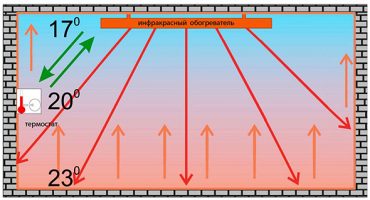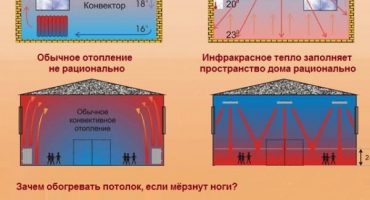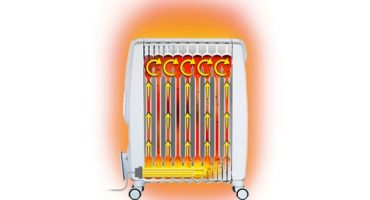Not always central heating is enough to obtain a comfortable temperature in the house, especially in the fall, when heat supply organizations are waiting for standard temperature indicators. I have to use additional heating appliances, the most popular of which are oil heaters and convectors. What to use, a heater or convector, can be determined by studying their features, advantages and disadvantages.
Heaters
Despite the diverse design, everything oil heaters work according to the general principle - inside the metal case is mineral oil, which is heated by an electrical element.
After switching on, the heating element in the unit transfers thermal energy to the oil, which, in turn, heats the metal casing. The surrounding air, when in contact with the device, heats up and gradually spreads around the room.

The oil heater can be matched to any type of interior.
The heating level of the thermal element, and, therefore, the degree of warming of the surrounding air, in oil devices is regulated by the control device. As soon as the oil temperature in it reaches a certain value, the heating element turns off, and after a little cooling it turns on again. It should be remembered that in this way the device only monitors the temperature of the equipment itself, the ambient temperature does not affect this process and depends on the power of the device and the number of sections in it.
Design features
Depending on the installation method, oil devices are divided into the following types:
- Floor standing. Convenient in that they easily move around the apartment, they can be removed after use.
- Wall mounted. They take up less space and warm the air faster because they have more power.

Oil heaters are used as primary or secondary heating.
Advantages and disadvantages
The oil heater has the following advantages:
- Silent work. Devices can be placed in rooms requiring increased silence.
- High security. The heating element is not available, therefore it is impossible to burn yourself.
- Long service life. Modern models have protection against overheating and can work without interruption for a long time.
- The air in the room does not dry out.
- Lack of extraneous odors during the work.
- Low cost.
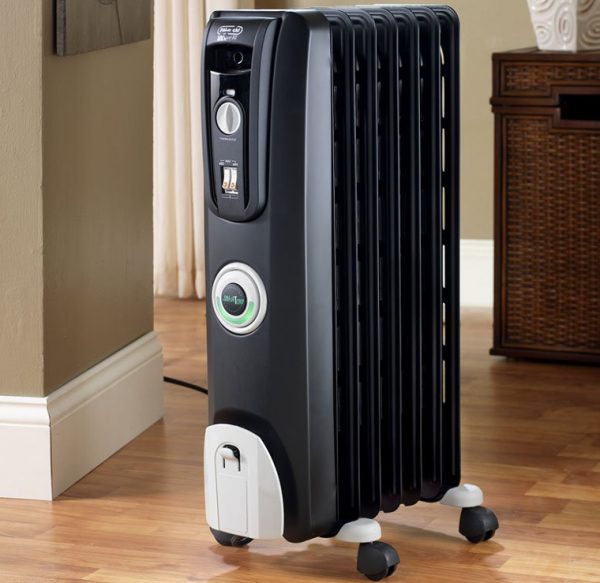
Oil coolers have an attractive design, are silent and safe
However, a number of disadvantages are inherent in such devices:
- Due to the massive body and the oil inside they are quite heavy.
- For a long time they heat the air in large rooms.
Important! When choosing an electric heater, you need to pay attention to its power - the more it is, the faster the room will heat up. But when working with other energy-intensive devices: washing machines, microwaves, it will create an increased load on the electrical network.
Convectors
These devices use the principle of convection in their work, when heated air becomes lighter and is forced up, giving way to a colder one, it heats up and the cycle continues again. Thanks to this movement, all the air in the room is gradually heated.
The main difference from the heater is that the heating element in the convector acts directly on the air, so that the casing of the device almost does not heat up.
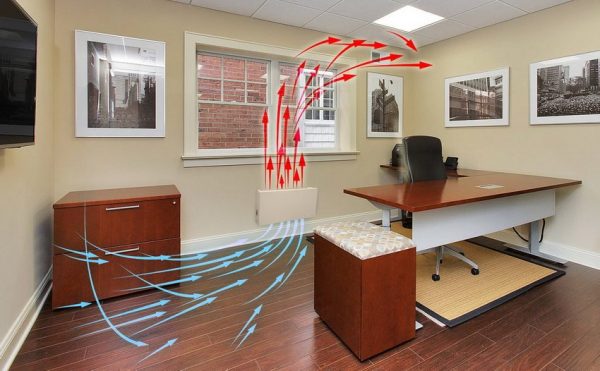
Convectors use air circulation to heat a room
Depending on the consumed energy, convectors differ in:
- gas;
- water;
- electric.
The most widely used electrical devices
By the method of installation, convectors can be:
- wall mounted;
- embedded in the floor;
- portable.
Advantages and disadvantages
Advantages of convection models:
- Rapid heating of indoor air. The heating element acts directly on the air and heats the room several times faster.
- Security. The case almost does not heat up and it is impossible to burn yourself.
- Silent work. Convectors do not make any sounds when heating a room.
- Profitability. The device heats the room faster, saving energy.
- Reliability. Due to the small number of components, convectors serve without breakdowns for a long time.
- Complete with an ambient temperature sensor with the ability to adjust the degree of heating.
- Low cost.

Portable convectors have an attractive design and are located anywhere in the room
These devices also have disadvantages:
- Dust accumulates on the heating element, so a specific smell arises when heated.
- When using the convector, the air in the room is dried out, therefore, its additional humidification is required.
Attention!An infrared convector can reduce these shortcomings, but such devices are characterized by lower power and are effective only for rooms up to 20-25 sq.m.
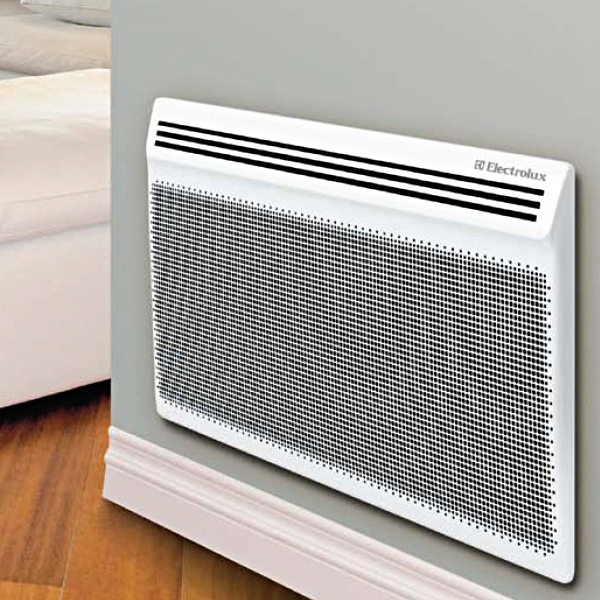
Wall mounted infrared converter
Comparison of heaters and convectors
To determine what is best to buy - a heater or convector, you should study their characteristics in comparison.
| Heater | Convector | |
| Room heating time | Slow heating. It takes time to warm up the oil in the device. | Fast heating due to direct exposure to air. |
| Energy consumption, economy | High consumption, low profitability. | Low consumption, high profitability. |
| Ease of installation | High weight makes it difficult to move and install devices. | Light weight makes it easier to install and move devices. |
| Ease of use | Units depending on the cost are equipped with the necessary sensors with the ability to control the degree of heating | |
| Safety of use | The case heats up significantly. | The case practically does not heat up. |
| Durability | Shorter life and costly repairs. | Long life and easy repair. |
| Degree of protection | Protection against overheating, power surges and falling is installed only in expensive models. | Installed protection against overheating, power surges and falling. |
| Health safety | Does not dry the air in the room. | Dries the air in the room. |
| Cost | In general, the difference in cost is small and depends on the number of additional sensors and control devices. | |
Given all the characteristics, we can say that for long-term use, convectors are more preferable than oil heaters. When choosing a model for home or office, it is necessary to evaluate those characteristics that most strongly affect the comfort of using a heating device.
Choosing a heater
Finally, video reviews will help determine the choice of heating devices.
Choosing a convector heater
Test purchase. Oil Heater Selection

